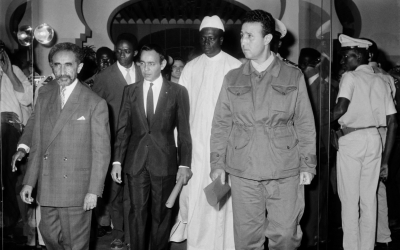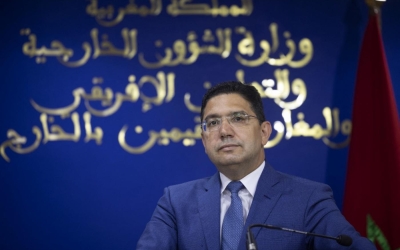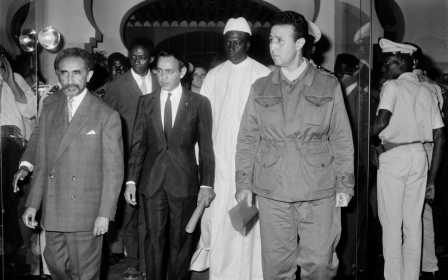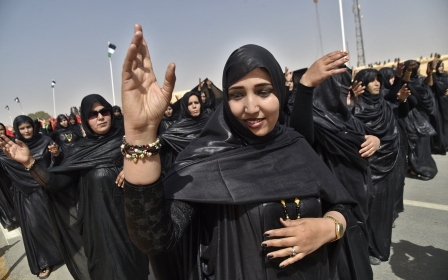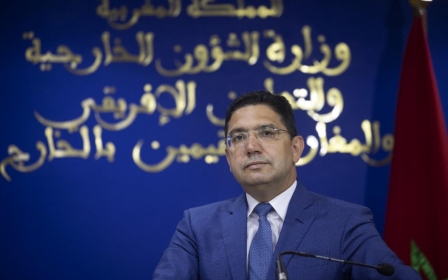Moroccans in Algeria fear for the future after diplomatic ties severed
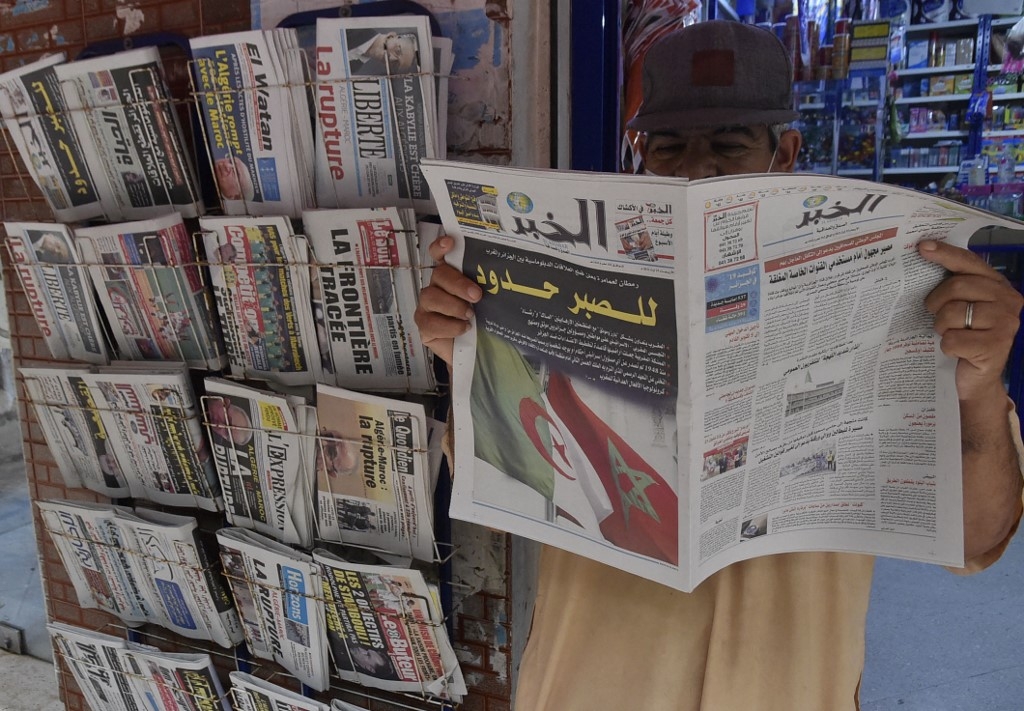
For 34-year-old Mohsen, who has been living in Algeria since 2008, the announcement by Algiers on Tuesday that it was severing diplomatic ties with Morocco, citing "a series of hostile manoeuvres," aroused feelings of trauma.
"Of course our thoughts went immediately to the 1975 crisis. We just hope the same thing isn't going to happen again," he told Middle East Eye.
On 18 December 1975, Algeria's president at the time, Houari Boumediene, took the decision to expel all Moroccan nationals from the country. After the severance of diplomatic ties by Rabat in 1976, due to a dispute between the two countries over the issue of the Western Sahara, some 350,000 Moroccans were reportedly expelled from Algeria.
It was not until 1983 that free movement was restored for residents of the two countries and an agreement was signed on the progressive free circulation of people and goods, and the opening of air and railway links.
Nearly 40 years after that crisis was resolved, Moroccans now find themselves in the dark about what the future holds.
"I think of my married friends who have children to feed, and of Algerian-Moroccan couples. This will be terrible for them," Mohsen, a tradesman from Fez, said. "I hope they aren't kicked out. I hope it doesn't come to that."
Mohsen chose to settle in Algeria in 2018 after discovering the Algerian coast and, more importantly, seeing opportunities for work in the construction industry.
Since the beginning of the Covid-19 crisis, "the markets have shrunk for sure, but I can make a good living from my trade. I have everything I need apart from the papers that would regularise my status."
According to the Algerian Centre for Research in Applied Economics for Development (CREAD), about 45,000 Moroccans were living in Algeria in 2010. More recent census data is not made public and does not, in any case, include Moroccans like Mohsen, who entered the country undocumented to work.
Unexpected news
Hamza, 32, also works in the construction sector, in the northeastern city of Skikda. He no longer remembers the day he arrived in Algeria.
"I must have been 18 or 20. In the village I'm from, there are only old people left. All the young people leave. I'm a child of Algeria. Everything I've done and everything I've learned has been in Algeria," he told MEE.
Although not politically engaged, he expresses his profound regret at Algeria's decision to break off ties with Rabat.
"I was hoping the day would come when the borders would be open and an expanded Maghreb Union would become a reality," Hamza said, referring to a 1989 five-nation pact for the region. "I don't know what tomorrow will bring. I can only put my faith in God."
'I describe Morocco as my biological mother and Algeria as my adoptive mother'
- Aareb, Moroccan tradesman
Aareb is an interior decorator by trade. At the age of 37, this native Moroccan from the city of Fez commented that he has now spent more of his life in Algeria than in the country of his birth.
"I arrived when I was nearly 15 and settled in Mila" in eastern Algeria, he told MEE.
"In my home country, I describe Morocco as my biological mother and Algeria as my adoptive mother. I've made my life here and, apart from my family, I no longer really have anything in Morocco."
Aareb emphasised that, like many Moroccans living in Algeria, he is not entitled to residency. For more than six years, he has been going home every 90 days to renew his residence permit in Algeria. These arduous journeys allow him to see his wife, who remains in Fez.
"I hope to find a solution and bring my wife over. I'm not political, I don't know what’s going on. I work all day on building sites and, thank God, since I got here my work has always been in high demand," he said.
Aareb recalls his first reaction upon hearing news that the two neighbouring countries would no longer have diplomatic relations.
"A friend called to give me the news. In shock I hung up the call, made ablutions and prayed, asking God for the situation not to get any worse, for me not to be expelled and for me to find a solution to be able to live together with my wife."
Aareb said he "didn't sleep a wink all night," feeling helpless and at the mercy of political decisions.
"I still have work going on here, and I was counting on building my life here in Algeria. I pray that we are not expelled too quickly and that the [authorities] leave me enough time to finish my projects and pay off my debts," he added, half-jokingly.
"Algerian security forces have always treated me well, and I've always felt at home here, among my brothers. People have taken me in when I've needed a place to stay, lent me money when I've found myself in difficulty, and I've never lacked work or in fact anything at all," Aareb said.
"To be honest, if it were possible to get Algerian residency or citizenship, it would save me a lot of problems."
'Temporary clouds'
The announcement of the severing of ties between Algiers and Rabat also came as a shock for YouTuber Ismail Farih.
"I sincerely hope that the situation improves. I wasn't expecting this at all. I have life plans here. It's too soon to say whether this decision will have an impact on these projects," said the influencer, who has more than 46,000 followers on YouTube.
Farih's intention was to build a life in Algeria and start a family. For him, the political tensions between the two countries were nothing more than "temporary clouds," as he expected that the situation would soon calm down.
For several years now, the 25-year-old said, he has been trying to "bring the two nations closer together" and "help them overcome prejudice".
"I understood there were tensions between the two countries when I decided in April 2017 to follow in my brother's footsteps and come to work in Algeria," he said.
"I've never had any difficulty integrating in Algeria, because we have far more things in common than we have differences."
The then-interior decorator decided to convert his nascent music-focused YouTube channel to focus on the discovery of the cultures and customs of the two neighbouring countries.
"I realised that the Algerians really liked all content associated with tourism and adventure. Then I decided to focus on this type of content with the aim of bringing the two peoples closer together," Farih said.
'People belong in the country that feeds them'
Murad, a skilled plasterer who has lived in Skikda since 2006, also said that he is "very happy in Algeria".
"There's plenty of work. I feel like I can prosper professionally here. All that's lacking is my wife and two children," the 40-year-old, who is originally from the northeast of Morocco, said.
With the pandemic and the suspension of air services. Murad has not seen his family in "one year, seven months, 13 days and 12 hours".
Like Aareb, Murad hoped to bring his wife and children to live with him in Algeria, but currently spends all his holidays in Morocco.
"I've travelled through 35 wilayas [districts], I know people all over. I know that Algeria and the Algerian people don't have any problem with the Moroccan people," he told MEE.
"According to our Prophet Muhammad, we belong in the country that feeds us, and for me, since 2006, that's Algeria," the plasterer said. "Political issues go over my head... I don't know much about politics, but Algeria must have its reasons for doing what it has done."
'It's people like us, those stuck in the middle, who suffer the most'
- Mohamed, Algerian student in Morocco
Mohamed, 21, an electronic engineering student in Oran, does not share this opinion.
"I hope one day the land border will be reopened. It goes without saying that the announcement of the severing of diplomatic ties between Algiers and Rabat has made me angry. I don't understand it!" he told MEE.
Due to the pandemic, it's been nearly two years since he was last able to return to Morocco to visit his family.
Mohamed said that he's still happy in Oran, where his colleagues and everyone he knows treat him with unfailing warmth and kindness.
"Sometimes, when people find out I'm Moroccan, they treat me better than their fellow nationals. I often get invited by my colleagues and their families to dinner or to spend the night. I've never had the slightest problem," he said. "I really resent these political disputes because it's people like us, those stuck in the middle, who suffer the most."
- This article is an edited translation of a story originally published by Middle East Eye's French website.
Middle East Eye delivers independent and unrivalled coverage and analysis of the Middle East, North Africa and beyond. To learn more about republishing this content and the associated fees, please fill out this form. More about MEE can be found here.


